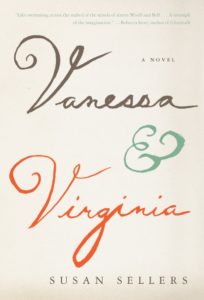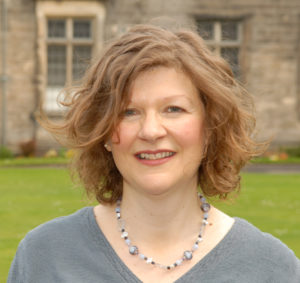Virginia Woolf in Tehran
 The novel, ‘Vanessa and Virginia’, by Susan Sellers, a Professor of English at the University of St Andrews, has been translated into Farsi by Zahra Amini, a graduate of the University of Tehran where she studied English Literature. ‘Vanessa and Virginia’ is a fictional portrait of the writer Virginia Woolf and her painter sister Vanessa Bell, and has already been translated into over a dozen languages including Brazilian, Chinese and Japanese.
The novel, ‘Vanessa and Virginia’, by Susan Sellers, a Professor of English at the University of St Andrews, has been translated into Farsi by Zahra Amini, a graduate of the University of Tehran where she studied English Literature. ‘Vanessa and Virginia’ is a fictional portrait of the writer Virginia Woolf and her painter sister Vanessa Bell, and has already been translated into over a dozen languages including Brazilian, Chinese and Japanese.
The Iranian translation is published by Roshangaran, a feminist press in Tehran. The name means ‘the enlightened’. It was founded in the 1980s by Shahla Lahiji, Iran’s first woman publisher, as a response to the discrimination and restrictions imposed on women by the Islamic Revolution. Since then, it has published hundreds of books by women authors as well as books promoting women’s causes, and has received numerous international accolades including the PEN/B arbara Goldsmith Freedom to Write Award, the International Publishers Association Freedom to Publish Prize, and the Pandora Award for Women in Publishing.
arbara Goldsmith Freedom to Write Award, the International Publishers Association Freedom to Publish Prize, and the Pandora Award for Women in Publishing.
Roshangaran’s pro-women, feminist agenda has however brought it into conflict with the Ministry of Culture and Islamic Guidance in Iran. Shahla Lahiji has been arrested and imprisoned on charges ranging from working to corrupt women to inciting anti-Islamic feeling. In an interview for the pan-Arabian daily newspaper Asharq Al-Awsat, Shahla Lahiji comments: ‘When I entered the publishing industry in Iran, I was the only woman. Now there are about 400 publishing houses owned and run by women. We have established the women publishers association, which is one of the most powerful civil organizations in Iran. I’m optimistic about the future because it is difficult to stop the pressure for advancement.’
 The Farsi translation of ‘Vanessa and Virginia’, like all books in Iran, has been subject to the scrutiny of the Ministry of Culture and Islamic Guidance. In order to obtain the necessary licence for publication, a number of changes to the original novel had to be made. In particular, any reference to extra-marital or same-sex relationships had to be cut since these are forbidden under Iranian Islamic law. Even what might be considered as relatively innocent encounters between the sexes such as dancing was not permitted, while any word that had a sexual connotation such as ‘love-making’ had to be modified. Speaking about these changes, the English author Susan Sellers commented: ‘Virginia Woolf and Vanessa Bell were pioneering not only in their chosen art forms of writing and painting, but in terms of the way they chose to live their lives. With their move to Bloomsbury in 1904 they rejected many of the rules that had constrained Victorian women’s existence. In terms of their relationships they valued honesty and enduring friendship above all else, and their at times complicated love lives meant we had to be creative when it came to depicting these in Iran. Some of the changes I made to the text were small and relatively straightforward – for instance, in a description of a Vanessa Bell painting the forbidden word ‘nude’ was replaced with ‘figure’. In several places I was able to rewrite without too much loss of meaning. However, for some sections cutting was often the only viable option. This was particularly the case for passages depicting homosexual love. Of course, all this raises difficult questions about the truth of what is being told.’
The Farsi translation of ‘Vanessa and Virginia’, like all books in Iran, has been subject to the scrutiny of the Ministry of Culture and Islamic Guidance. In order to obtain the necessary licence for publication, a number of changes to the original novel had to be made. In particular, any reference to extra-marital or same-sex relationships had to be cut since these are forbidden under Iranian Islamic law. Even what might be considered as relatively innocent encounters between the sexes such as dancing was not permitted, while any word that had a sexual connotation such as ‘love-making’ had to be modified. Speaking about these changes, the English author Susan Sellers commented: ‘Virginia Woolf and Vanessa Bell were pioneering not only in their chosen art forms of writing and painting, but in terms of the way they chose to live their lives. With their move to Bloomsbury in 1904 they rejected many of the rules that had constrained Victorian women’s existence. In terms of their relationships they valued honesty and enduring friendship above all else, and their at times complicated love lives meant we had to be creative when it came to depicting these in Iran. Some of the changes I made to the text were small and relatively straightforward – for instance, in a description of a Vanessa Bell painting the forbidden word ‘nude’ was replaced with ‘figure’. In several places I was able to rewrite without too much loss of meaning. However, for some sections cutting was often the only viable option. This was particularly the case for passages depicting homosexual love. Of course, all this raises difficult questions about the truth of what is being told.’
About these alterations, translator Zahra Amini comments: ‘Though it was regrettable that certain aspects of the text had to be cut, altered or softened, Iranian readers are perfectly used to reading between the lines and understanding from even small insinuations. It saddens me that most Europeans and Americans mistakenly think Iran is the same as parts of the Arab world such as Saudi Arabia, where women have only recently acquired the right to vote. The women of my country have had the right to vote for over 50 years, and while there is still a long way to go in terms of equality and freedom, women here marry or enter relations as freely as women in Europe or America, study and lecture at universities, have successful careers in almost every field and occupy some of the highest positions in society. We’ve grown up with books that have been heavily censored and this has made us highly attentive as readers.’
At the novel’s launch at the Tehran International Book Fair, Shahla Lahiji and Zahra Amini gave talks about the Iranian translation of ‘Vanessa and Virginia’ and the remarkable sisters who inspired it. Zahra remarks: ‘Virginia Woolf’s writing is well-known in Iran, as is the work of the Bloomsbury Group to which she belonged. Reading Susan’s novel, it was as if I was intimately living moments of Woolf’s life whilst simultaneously tunneling back through my encounters with her writing. I wanted other Iranian readers to share this experience. The fact that Virginia Woolf’s sister, Vanessa Bell, is hardly known at all in Iran outside of art schools and galleries was another motivating factor.’
Commenting on the collaboration, Susan Sellers adds: ‘Reading about and working with women in Iran has been an education. Like most of the rest of the world, Iran has long been a patriarchy, and in this sense it seems little changed for women following the Islamic Revolution forty years ago. Women in Iran are subject to discrimination and constraint in almost every sphere, from unequal pay at work to bias in divorce to the compulsory wearing of the hijab. Gains have been made for women thanks to the stands taken by brave activists, but there is still a long way to go.’
Zahra Amini continues: ‘Women around the world will only have the chance for full equality once the patriarchal contract has been torn up and rewritten. Virginia Woolf knew this and wrote about it in books such as her landmark ‘A Room of One’s Own’. Her sister Vanessa Bell was also a revolutionary. I hope my translation of Susan’s novel about these two pioneering sisters will inspire women in Iran not to lose hope, but to continue to advance and thrive.’
Source for interview with Shahla Lahiji.
Susan Sellers is available for interview. Please email her on [email protected] to arrange a time to speak.